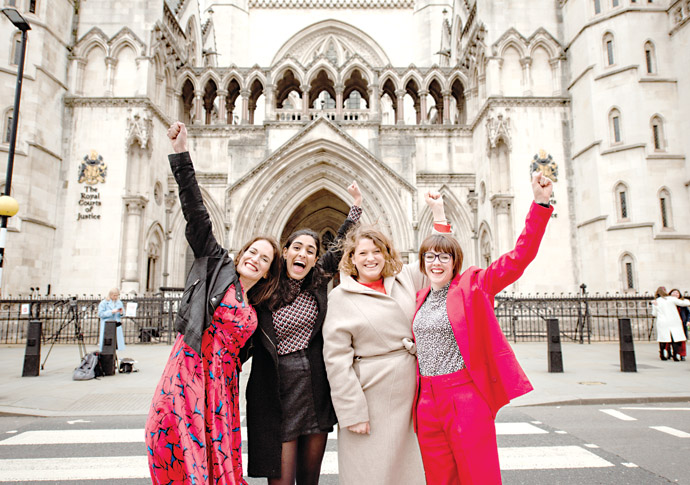Vigil campaigner: The responsibility for all this lies with men, not women
Friday, 29th April 2022 — By Anna Lamche

Jamie Klingler, with fellow campaigners, after their High Court victory
WOMEN’S safety has improved in the past 20 years, but there is still a “raft of challenges” to face up to, the co-founder of a women’s rights campaign has said.
Jamie Klingler, 43, co-founded the Reclaim These Streets movement in March last year in response to the death of Sarah Everard.
The campaign, which seeks to secure the personal safety of women in public spaces, originally coalesced to organise the now-infamous vigil for Ms Everard in Clapham Common.
At the time, the Metropolitan Police said coronavirus legislation rendered the vigil “illegal,” meaning its organisers, including Ms Klingler, were not allowed to attend the event they had arranged.
Despite the national anger around the case, the group was forced to cancel the event and the Met threatened campaigners with prosecution and a £10,000 fine.
An impromptu vigil still took place and police clashed with protesters, arresting nine women.
The photographs of this incident only increased the anger and led to more questions over the police’s handling of the issue.
This year, the High Court found that the Met Police had breached the rights of the organisers. On Friday, the Met Police announced it would, for the second time, attempt to challenge this ruling.
Ms Klingler now wants to see “major, major reform” of the police.
“I want the next commissioner to be a visionary who drags the Met into the future,” she said.
Ms Klingler, who also participated in the “Take Back the Night” protests 20 years ago, said women’s rights have improved since she was in college.
“But I also think that as online stuff has evolved, younger women are facing an entirely new raft of challenges today,” Ms Klingler said.
She is particularly concerned about the scale of online harassment women face.
Earlier this year, Ms Klingler found herself at the centre of a national debate on digital hate after someone set up a false Instagram account in her name, posting explicit images and directing followers to a pornography website.
Ms Klingler mobilised her army of followers to shut the account down, but the experience still worries her.
“I’m 43 and I know that wasn’t my body. But what about a 16-year-old, when it is her body, and she kills herself?” Ms Klingler said.
Reflecting on the past year, she added: “How many times can you say that women don’t deserve this, how many times can you say it’s an epidemic of violence?
“It’s been a painful year, but we’ve kept it in the public eye.”
For Ms Klingler, the responsibility for women’s safety lies not with women but with men.
“For me the ideal situation is men calling [misogyny] out – imagine three teenagers in a car and somebody yells something at a woman,” she said. “If one of them said ‘that’s disgusting, I’m never getting in a car with you again’ – that’s the goal, that it becomes institutionally abhorrent.”
She added: “What we need is normal men to question their responsibility, and their involvement, and how they can play a part in making the world safer.”
In response to the vigil verdict, Assistant Commissioner Louisa Rolfe said: “The Met unreservedly endorses the principle that fundamental freedoms, such as those exercised by the claimants in this case, may only be restricted where it is necessary and proportionate for a lawful purpose.
“It is, however, incumbent on the Met to ensure that this judgment does not unduly inhibit its ability, and that of police forces across the country, to effectively balance competing rights in a way that is operationally deliverable.”